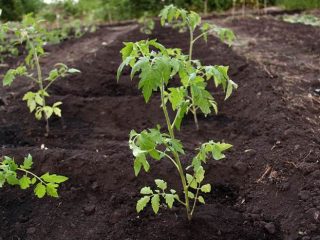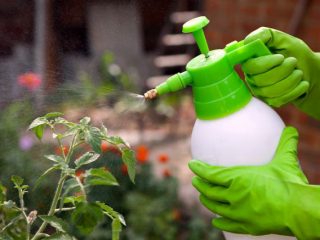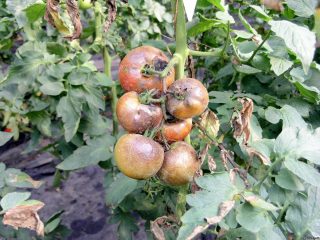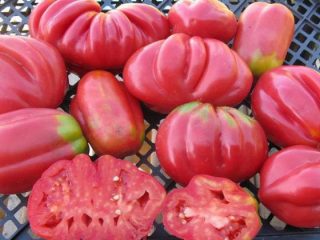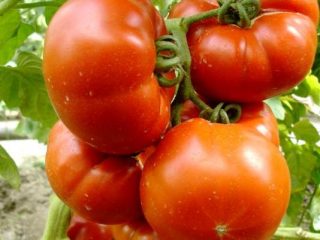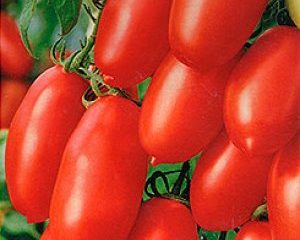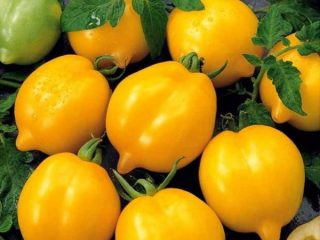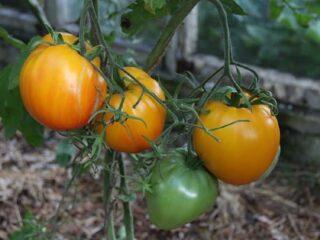Content
Tomato Bells of Russia is an early variety of determinant type of domestic selection for open and protected ground. It has an interesting fruit shape, excellent taste, and resistance to a number of diseases. It is planted through seedlings; it requires comprehensive care.
History of origin
Many people are already familiar with the Kolokola tomato of Russia on the domestic market. In 2000, the variety was added to the State Register of the Russian Federation. In accordance with it, the tomato has two originators - the Institute of General Genetics named after N.I. Vavilov (Moscow) and the Belgorod agricultural company Rostock.
Description of the tomato variety Kolokola Rossii
The variety Bells of Russia is an early ripening crop. From the moment of sowing seeds for seedlings until harvest, an average of 105 days pass. When grown in a greenhouse, the fruits ripen earlier. The harvest can be harvested in just three months.
Bells of Russia is a determinate type variety. This means that the culture is limited in growth. Standard bushes. Their main characteristics:
- height 0.5-0.6 m;
- foliage is average;
- stems erect;
- The leaves are medium in size and light green in color.
Tomato Bells of Russia forms inflorescences of a simple type. The first one is laid after 6-7 sheets, the next after 1-2. The brushes of this variety are elegant. Each one produces 6-7 fruits. Main characteristics:
- strongly pear-shaped;
- color pink-red, rich green when ripe;
- the skin is smooth and dense;
- average fruit weight 55 g;
- aligned size;
- excellent taste, slight sourness present;
- the pulp is juicy, dense, sugary;
- a small amount of seeds.
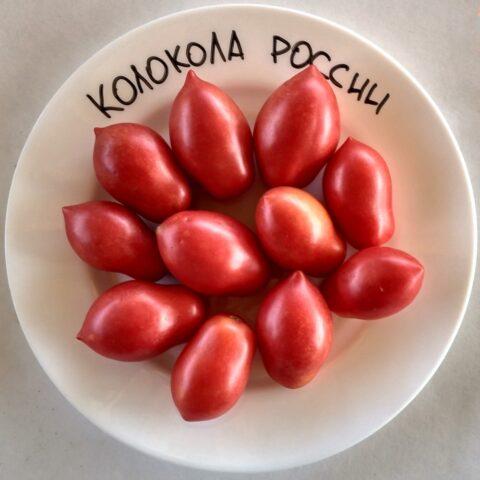
A characteristic feature of Kolokola Rossii tomatoes is their pronounced pointed tip.
Characteristics of the tomato Bell of Russia
The variety Bells of Russia is not afraid of adverse weather conditions. The culture tolerates minor cold snaps well.
Tomato yield Kolokola Rossii
The Bells of Russia harvest is harvested in July-August. The fruits ripen together. Up to 3 kg of tomatoes are harvested from a bush. If you follow the recommended planting pattern, 1 m² produces up to 12 kg of fruit.
Bells of Russia tomatoes can be harvested when they just begin to turn pink. They tolerate transportation well and ripen well at home. This technique accelerates the ripening of the remaining fruits on the bush and increases productivity.
Resistance to diseases and pests
Tomato Kolokola Rossii has high immunity. The variety has resistance to major crop diseases, including:
- dry spotting (alternaria);
- verticillium wilt;
- late blight;
- Fusarium
Where is it used?
In accordance with the State Register of the Russian Federation, the Kolokola Rossii tomato is recommended for whole-fruit canning. Thanks to the dense skin, the fruits hold their shape well and do not crack. The below-average dimensions and pear shape allow for compact placement in jars. Excellent taste and juicy pulp make tomatoes of this variety a desirable product on the table and fresh, including in salads.
Advantages and disadvantages
Thanks to the possibility of growing both in open ground and under film, the Kolokola Rossii variety is suitable for different Russian regions. The popularity of this tomato is also due to its resistance to a number of unfavorable factors.
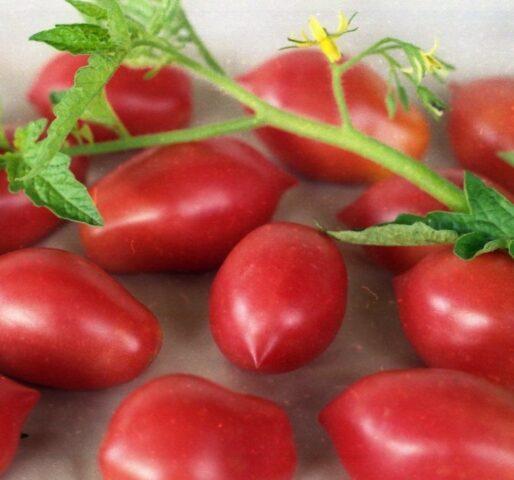
The Russian bell tomato produces a healthy harvest even in unfavorable weather conditions
Pros:
- original form;
- excellent taste;
- leveled fruits;
- juicy and sugary pulp;
- early and friendly maturation;
- crack resistance;
- transportability;
- high marketability;
- good immunity to culture-specific diseases
Minuses:
- the need for moderate stepsoning;
- limited growth;
- demands on soil fertility.
Features of cultivation
Tomato Bells of Russia is grown through seedlings. Sowing of seeds is carried out from mid-March to April. The seedlings are moved to a permanent location in May-June. Its cultivation takes about two months after germination. By this time the soil should warm up to at least 15 °C to a depth of 10 cm.
The optimal temperature for germination of seeds of the Kolokola Rossii variety is 20-25 °C. Growing seedlings is easy:
- Discard the seeds, disinfect them in a solution of potassium permanganate, soak them in a growth stimulator (follow the instructions), and germinate them.
- Fill glasses or boxes with soil - you can buy a ready-made mixture or make your own.
- Moisten the soil.
- Sow the seeds.
- Organize a shelter until seedlings appear, then remove, reduce the temperature to 17-18 °C, and after a few days increase to the previous levels.
- Plant seedlings at the 2-3 leaf stage.
The seedlings are regularly moistened and fed with ready-made complex fertilizers such as Kemira.
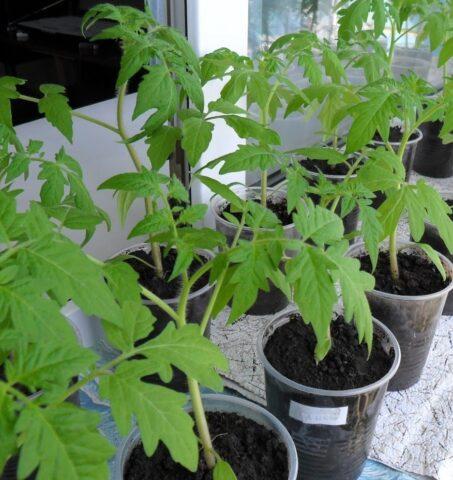
At least two weeks before planting in the ground, hardening of seedlings begins, gradually increasing the time
It is recommended to plant seedlings in the ground according to a 40x60 cm pattern. 3-4 bushes can be placed per 1 m².
The area for tomatoes is prepared in the fall. The soil is dug up, weeds are removed, humus and superphosphate are added. Use wood ash effectively.
Tomato care
The Bell variety of Russia requires comprehensive care. It includes the following activities:
- Watering. They start it a week after planting in the ground. Spend 3-5 liters of water on the bush and water it at the root.
- Feeding. It is recommended to alternate organic and mineral fertilizers. Potassium-phosphorus compositions are effective. From the beginning of fruit formation, nitrogen is not used or the dosage is reduced as much as possible. Feeding begins 2.5 weeks after planting.
- Stepsonning. It is carried out once every 1.5-2 weeks. Leave stumps up to 2 cm.
- Regular weeding.
Tomato Bells of Russia are formed into 2-3 trunks. They need to be tied up. The same measure is needed for branches with tassels during mass fruiting.
Pest and disease control
The Bell of Russia tomato has good immunity, so diseases characteristic of the culture rarely affect it. To maintain such sustainability, it is important to observe crop rotation, ventilate greenhouses, and competent and comprehensive care.
Plantings may be damaged by aphids. There are several methods of struggle:
- drugs – Aktara, Enzhio, Actellik, Fitoverm, Akarin;
- folk remedies - soap, ash solution, infusions of garlic, mustard, yarrow;
- repellent plants - marigolds, basil, fennel.
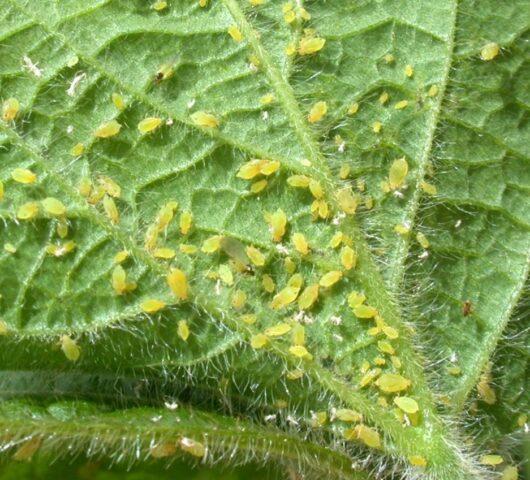
Treatment against aphids is carried out not only to solve an existing problem, but also to prevent it
When grown in a greenhouse, Kolokola Rossii tomatoes may suffer from thrips. There are several methods of struggle:
- drugs – Fitoverm, Fufanon, Karbafos, Actellik, Enzhio, Shar Pei, Tsunami;
- folk remedies - infusion of marigolds, garlic, green soap;
- sticky traps.
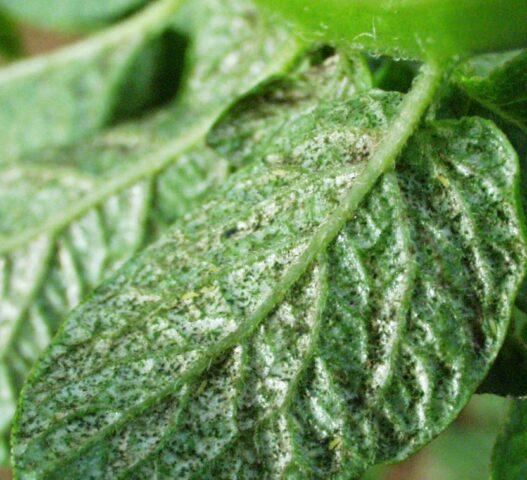
Thrips are secretive - they are usually discovered when the population becomes huge
Conclusion
Tomato Bells of Russia is an early ripening determinate domestic variety included in the State Register of the Russian Federation. It can be grown in open ground and under film, planted only through seedlings. The variety has tasty pear-shaped fruits with juicy pulp, good immunity, and resistance to adverse weather conditions.
Reviews of tomato Kolokola Rossii
